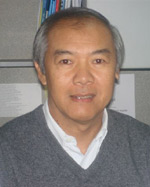Founding head of Lao research centre
appointed as Fisheries Programme coordinator

Mr Xaypladeth Choulamany
The Mekong River Commission has appointed a senior official from the Lao Ministry of Agriculture and Forestry as the first Fisheries Programme Coordinator from a riparian country. Mr Xaypladeth Choulamany took up the position in January, succeeding Dr Chris Barlow who has become the programme's technical advisor.
For the past five years, Mr Xaypladeth has overseen international cooperation and investment in the agriculture and forestry sectors. This was initially as Deputy Permanent Secretary of the ministry and later as Deputy Director General of the Department of Planning and International Cooperation where he was mainly in charge of international cooperation and investment following the ministry's restructuring in 2007. Before that, he was actively involved in establishing the Living Aquatic Resource Research Center (LARReC) in Vientiane, serving as its founding director between 1999 and 2004. Mr Xaypladeth has also been active in developing numerous community fisheries programmes in the Lower Mekong Basin.
New advisory position
With the appointment of Mr Xaypladeth as Programme Coordinator, Chris Barlow has been appointed as Chief Technical Advisor to the Fisheries Programme. Dr Barlow joined the programme in Phnom Penh in 2001 and was appointed Manager in 2003, moving to Vientiane in 2004 when the MRC secretariat was relocated to Lao PDR. In his new role as technical advisor, he will oversee the programme's inputs to the assessments of water resource developments, especially those relating to dams on the mainstream of the Mekong. He will also continue to be responsible for communications and publications coming from the programme, as well as planning for Fisheries Programme Phase 3, which will cover the period 2011-2016.
Commenting on his new appointment, Dr Barlow said he was extremely pleased that he could remain involved in the programme at this time as the MRC Secretariat, along with fisheries, faces an unprecedented era of potentially big changes in the use of the river's water resources. He repeated an earlier comment in Catch and Culture that with good planning, the people of the region could enjoy the benefits of hydropower development while maintaining the current productivity of the river's fisheries.
"The fishery of the Mekong is hugely important for the nutrition and economy of the people in the region, particularly the rural poor. We need sound planning to both protect the natural wealth - the fisheries and associated wetlands - as well as generate new wealth from industries such as hydropower and irrigation. Finding the right balance is technically and politically difficult," Dr Barlow said. He further added that he personally considered it a privilege to be in a position to contribute to such debate.
Xaypladeth Choulamany joined the Ministry of Agriculture and Forestry in 1982 after his return from the Soviet Union where he completed a master of science degree in agricultural economics at the Byelorussian Academy of Agriculture. After working as an assistant planning chief and head of procurement at the State Agro-Processing Enterprise, he was appointed deputy national project director of a Lao- Australian livestock feed project in 1985. Between 1991 and 1995, Mr Xaypladeth served as national director of the Xiengkhouang Highland Development Programme, a community-based rural development programme in collaboration with the International Fund for Agricultural Development (IFAD) and the United Nations International Drug Control Programme (UNDCP). He has been actively involved in formulating national strategies for agricultural development, biodiversity, watershed-based development, wetland management and forestry in the ministry.
Mr Xaypladeth brings considerable regional and international experience to the Fisheries Programme. He was the Lao Senior Officials Meeting (SOM) Leader to the ASEAN Ministers for Agriculture and Forestry between 2004 and 2008. He has also served as member of the national team negotiating Lao accession to the World Trade Organisation (WTO), representing the Ministry of Agriculture and Forestry at four working party meetings in Geneva between 2004 and 2008 with responsibility for agricultural policies as well as sanitary and phytosanitary measures. In addition, Mr Xaypladeth headed the National Working Group on Agriculture and Forestry, Natural Resource Management and Environment to implement the principles of the Paris Declaration and the Vientiane Declaration on Aid Effectiveness.
In recent years, Mr Xaypladeth has been actively involved in gender issues. Since 2005, he has been helping the Lao Women's Union develop and implement gender-based rural development programmes for poverty alleviation. He has also served as vice chairman of the National Sub- Committee for Advancement of Women in Agriculture and Forestry (SCAW) and actively contributed to the ministry's SCAW and Gender Development Strategy and Action Plan.
As director of LARReC, Mr Xaypladeth prepared the aquatic resources component of the National Biodiversity Strategy in 2000. He also authored the report "Traditional Use and Availability of Aquatic Biodiversity in Rice-Based Ecosystems" in 2005.
 Steen
Christensen has returned to Denmark where has been working
on the fisheries of the Baltic Sea with the European Commission.
Since joining the MRC Fisheries Programme in 2007 as economics
advisor to the Fisheries Ecology, Valuation and Mitigation
Component, Dr Christensen was based at the Research Institute
for Aquaculture No. 2 in Ho Chi Minh City. The major thrust
of his research was working with colleagues from Cambodia,
Lao PDR, Thailand and Viet Nam to review and synthesise information
on the value of fisheries in the four countries on the Lower
Mekong Basin. National reports have been completed and Dr
Christensen is in the process of finalising the overall report
which will provide greater insight into the economic valuation
of fisheries in the region.
Steen
Christensen has returned to Denmark where has been working
on the fisheries of the Baltic Sea with the European Commission.
Since joining the MRC Fisheries Programme in 2007 as economics
advisor to the Fisheries Ecology, Valuation and Mitigation
Component, Dr Christensen was based at the Research Institute
for Aquaculture No. 2 in Ho Chi Minh City. The major thrust
of his research was working with colleagues from Cambodia,
Lao PDR, Thailand and Viet Nam to review and synthesise information
on the value of fisheries in the four countries on the Lower
Mekong Basin. National reports have been completed and Dr
Christensen is in the process of finalising the overall report
which will provide greater insight into the economic valuation
of fisheries in the region.
Since 2006, Mr Xaypladeth has been a member of the board of trustees of the Regional Community Forestry Training Centre in Bangkok. He is also a member of the board of trustees of the Land Development and Service State Enterprise and vice president of the Labour Union of the ministry. In addition to his Soviet degree, he has a master of science degree in rural development planning and rural settlement programs from the Asian Institute of Technology in Bangkok.
The Fisheries Programme is fortunate to have a person of Mr Xaypladeth's knowledge and experience in fisheries and international development leading the programme. His understanding of the importance of fisheries for the livelihoods of people in the region will be invaluable as the MRC undertakes strategic assessments in the near future of the development options for the water resources of the Mekong.
![]()
Choose a newsletter: